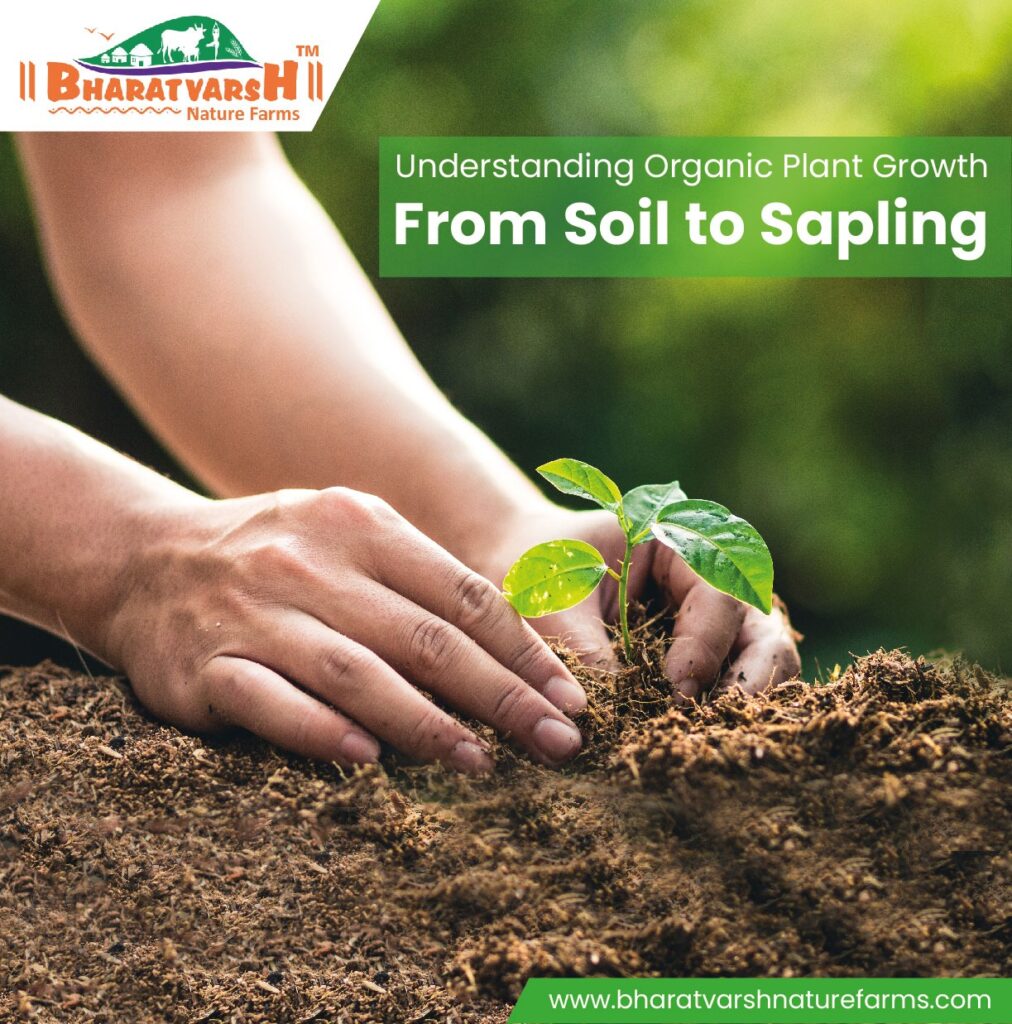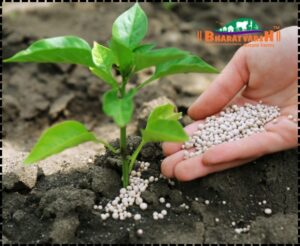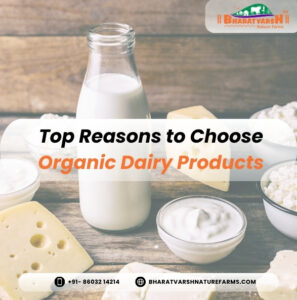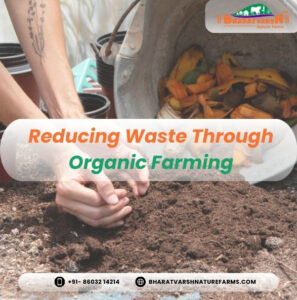In a world where chemicals have often taken over our food systems, there’s something deeply satisfying – even magical – about watching a tiny seed transform into a healthy, thriving plant, completely naturally. This journey, from soil to sapling, is the essence of Organic Plant Growth, a practice rooted in patience, care, and sustainability.
At Bharatvarsh Nature Farms, we believe in the power of going back to nature and letting it lead the way. By understanding Organic Plant Growth, gardeners and farmers can cultivate lush, nutrient-rich crops without harming the environment or our health.
Let’s dig deep (pun intended!) into what makes Organic Plant Growth special, explore essential practices, and share practical organic gardening tips to help you nurture your green companions from seed to sapling.
The Foundation: Soil Health for Organic Plant Growth
The journey of Organic Plant Growth begins with the soil. Healthy, living soil is the cornerstone of any thriving organic garden. Instead of relying on synthetic fertilizers, organic gardeners focus on enriching the soil naturally.
At Bharatvarsh Nature Farms, we use compost, vermicompost, and green manure to feed the soil. This method improves soil structure, promotes microbial life, and enhances the availability of nutrients – the essence of soil health for plant growth.
Why Soil Health Matters
- Microbial Diversity: Rich soil is full of bacteria, fungi, and other microorganisms that support natural plant growth methods.
- Nutrient Cycling: These microbes help break down organic matter, releasing nutrients that plants can easily absorb.
- Water Retention: Healthy soil retains water more efficiently, crucial in maintaining chemical-free plant care.
Starting with the Seed: Choosing Organic Seeds
The first step in Organic Plant Growth is selecting the right seeds. Conventional seeds might be treated with chemicals, but organic seeds are grown without synthetic pesticides or fertilizers.
Using organic seeds ensures that the plant’s entire lifecycle aligns with eco-friendly farming methods. It also promotes genetic diversity, making plants more resilient.
The Role of Composting in Organic Plant Growth
One of the best organic gardening tips is to start composting. Composting is nature’s way of recycling and is fundamental to organic composting techniques.
By converting kitchen scraps, garden clippings, and organic waste into compost, gardeners create a nutrient-rich amendment that improves soil fertility and supports sustainable gardening practices.
Composting Basics
- Collect vegetable peels, fruit scraps, coffee grounds, and dry leaves.
- Maintain a balance between “greens” (wet, nitrogen-rich) and “browns” (dry, carbon-rich).
- Keep it moist and turn regularly to encourage aerobic decomposition.
At Bharatvarsh Nature Farms, compost piles are like gold mines – full of life, warmth, and future plant nutrition!
Seed to Sapling: Understanding Growth Stages
A key to mastering Organic Plant Growth is knowing what happens at each stage from seed to sapling.
Germination
The seed wakes up when it senses moisture, warmth, and light. Roots break out first, anchoring into the soil and seeking nutrients.
Seedling
As the first leaves (cotyledons) emerge, the plant starts photosynthesizing. It’s delicate and needs gentle watering and protection – this is when chemical-free plant care is essential.
Vegetative Stage
True leaves develop, and the plant focuses on growing stems and foliage. This is a crucial time to provide organic compost and monitor for pests using natural plant growth methods.
Sapling
The plant establishes a stronger root system, becomes taller, and prepares for flowering or fruiting (depending on type). At this point, the foundation laid through soil health for plant growth pays off.
Companion Planting: Nature’s Bodyguards
A brilliant strategy in Organic Plant Growth is companion planting. It means growing certain plants together to boost growth and protect each other from pests.
For example:
- Marigolds deter nematodes and attract beneficial insects.
- Basil planted near tomatoes can improve flavor and repel pests.
- Beans fix nitrogen in the soil, benefiting leafy greens nearby.
Such sustainable gardening practices minimize the need for chemical sprays and support eco-friendly farming methods.
Watering the Organic Way
Water is life, but how you use it matters. Overwatering or poor watering methods can damage roots and wash away nutrients.
Organic gardening tips for watering include:
- Watering early in the morning to reduce evaporation.
- Using drip irrigation for deep, targeted watering.
- Mulching around plants to maintain moisture and regulate soil temperature.
Mulching is a champion among heat-resistant garden plants, especially during hot seasons.
Pest and Disease Management in Organic Plant Growth
Chemical pesticides are a big no in organic systems. Instead, natural plant growth methods rely on biological and physical controls.
Some approaches include:
- Introducing beneficial insects like ladybugs and predatory wasps.
- Using neem oil or soap sprays to deter harmful bugs.
- Regularly inspecting plants for early signs of trouble.
By focusing on chemical-free plant care, we support healthy ecosystems and encourage organic nursery plants to thrive naturally.
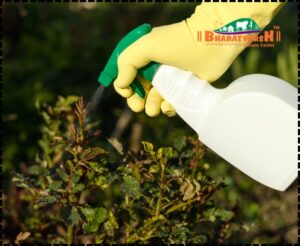
Benefits of Organic Plant Growth
The advantages of Organic Plant Growth go beyond just lush gardens.
Healthier Produce
Plants grown without synthetic chemicals are richer in nutrients and safer for consumption, aligning with the benefits of organic farming.
Improved Soil Health
With each season, the soil becomes more fertile, teeming with life and organic matter.
Environmentally Friendly
No harmful runoff or chemical residues, supporting cleaner water and air.
Economic Sustainability
While initial costs might seem higher, long-term yields and soil regeneration lead to cost savings.
At Bharatvarsh Nature Farms, these benefits drive everything we do. We believe that what’s good for the earth is good for us too.
Why Choose Organic Plant Growth Over Conventional?
Conventional farming might promise faster results, but it comes at the expense of soil degradation, pollution, and health risks.
Organic Plant Growth offers a gentler, more respectful approach to farming that works in harmony with nature rather than against it. From the use of organic composting techniques to careful pest control, each practice supports a balanced ecosystem.
Organic Plant Growth for Home Gardeners
You don’t need acres of land to embrace Organic Plant Growth. Even a small balcony garden can become a thriving organic oasis.
Start with potted herbs like basil and mint or leafy greens in containers. Use compost from kitchen scraps, and experiment with sustainable gardening practices.
These steps not only provide fresh, chemical-free produce but also offer a calming, therapeutic hobby.
The Role of Organic Nursery Plants
Choosing the right nursery plants is crucial for success. Organic nursery plants are grown without harmful chemicals from the very start, making them stronger and more resilient.
When you buy from trusted sources like Bharatvarsh Nature Farms, you’re investing in plants that align with eco-friendly farming methods, ensuring better survival and growth rates.
How to Get Started with Organic Plant Growth
- Assess Your Space: Whether it’s a garden bed, balcony, or rooftop, understand your growing area.
- Prepare the Soil: Enrich with compost and organic matter.
- Choose Organic Seeds or Seedlings: Always source from certified organic nurseries.
- Plan Your Garden Layout: Incorporate companion planting principles.
- Establish a Watering Routine: Emphasize deep, infrequent watering.
- Monitor and Adapt: Keep an eye out for pests, nutrient deficiencies, and environmental stresses.
FAQs
Q: What is the biggest challenge in Organic Plant Growth?
A: Patience! Unlike conventional farming, organic methods take time to show results. But the benefits are long-lasting.
Q: Can I grow organic plants in a small apartment?
A: Absolutely! Start with herbs and leafy greens using pots and vertical gardening setups. It’s a perfect example of sustainable gardening practices.
Q: Are organic fertilizers safe for all plants?
A: Yes, but always follow recommended dosages to avoid nutrient imbalances.
Q: How can I keep pests away without chemicals?
A: Use neem oil sprays, introduce beneficial insects, and practice good garden hygiene.
Q: Why should I choose organic over synthetic methods?
A: Choosing organic supports your health, enriches the soil, and promotes environmental sustainability.
Also Read: Planning a Family Trip to the Farm in Nagpur: Activities for All Ages – Bharatvarsh Nature Farms
Conclusion
Organic Plant Growth isn’t just a farming technique – it’s a philosophy, a lifestyle, and a commitment to nurturing the earth as it nurtures us. From building soil health for plant growth to choosing the right seeds and supporting chemical-free plant care, each step is a testament to patience and respect for nature.
At Bharatvarsh Nature Farms, we’ve witnessed firsthand how powerful these natural methods can be. Whether you’re a seasoned farmer or a new gardener, embracing Organic Plant Growth opens a world of healthier produce, richer soil, and a deeper connection with the environment.
So, grab that trowel, get your hands dirty, and start your journey from soil to sapling today. The rewards, both for you and the earth, are endless.
Follow us on:




Bharatvarsh Nature Farms
At Post Virli, Taluka, Dist, Umred, Maharashtra 441204




